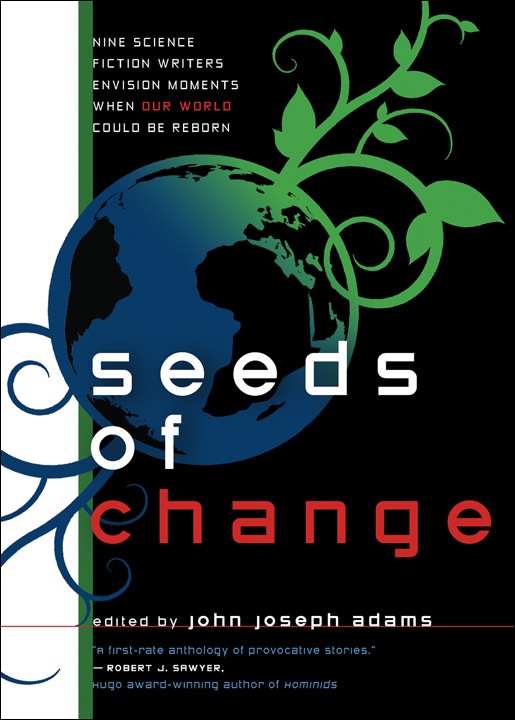Cover update & blurb!
Note the slight update to the Seeds of Change cover. On Sean Wallace’s blog, Patrick Nielsen Hayden rightly pointed out that my last name looked a lot like ROAMS instead of ADAMS in that font. So Stephen Segal tweaked the design to make my name more clear (by changing it from capital letters to lowercase).
Also, you might note the nice blurb provided by Robert J. Sawyer, which says "A first-rate anthology of provocative stories." Which was redacted down from:
"Isaac Asimov said science fiction is the branch of literature that deals with the responses of human beings to changes in science and technology. His definition put humans in a reactive role, and essentially had science and technology changing on their own. But we can also be proactive, actively making the future what we want — or what we dread. A first-rate anthology of provocative and disturbing stories gathered by the always reliable John Joseph Adams." — Robert J. Sawyer, Hugo Award-winning author of HOMINIDS
That means a lot to me, especially coming from Rob Sawyer. I’ve been a big fan of his for a long time–really ever since I seriously got interested in science fiction.



 Heroes Adrift: Moira J. Moore: Books
Heroes Adrift: Moira J. Moore: Books Dead To Me: Anton Strout: Books
Dead To Me: Anton Strout: Books Something Magic This Way Comes: Martin H. Greenberg,Sarah A. Hoyt: Books
Something Magic This Way Comes: Martin H. Greenberg,Sarah A. Hoyt: Books Goblin War: Jim C. Hines: Books
Goblin War: Jim C. Hines: Books Alliance Space: C. J. Cherryh: Books
Alliance Space: C. J. Cherryh: Books The Demon and the City: A Detective Inspector Chen Novel (Detective Inspector Chen Novels): Liz Williams: Books
The Demon and the City: A Detective Inspector Chen Novel (Detective Inspector Chen Novels): Liz Williams: Books

 Implied Spaces: Walter Jon Williams: Books
Implied Spaces: Walter Jon Williams: Books The Best Science Fiction and Fantasy of the Year, Vol. 2: Jonathan Strahan: Books
The Best Science Fiction and Fantasy of the Year, Vol. 2: Jonathan Strahan: Books Physics of the Impossible: A Scientific Exploration into the World of Phasers, Force Fields, Teleportation, and Time Travel: Michio Kaku: Books
Physics of the Impossible: A Scientific Exploration into the World of Phasers, Force Fields, Teleportation, and Time Travel: Michio Kaku: Books Anvil of Stars: Greg Bear: Books
Anvil of Stars: Greg Bear: Books Reaper’s Gale: Book Seven of The Malazan Book of the Fallen: Steven Erikson: Books
Reaper’s Gale: Book Seven of The Malazan Book of the Fallen: Steven Erikson: Books Tigerheart: Peter David: Books
Tigerheart: Peter David: Books Iron Angel: Alan Campbell: Books
Iron Angel: Alan Campbell: Books Before They Are Hanged (The First Law: Book Two): Joe Abercrombie: Books
Before They Are Hanged (The First Law: Book Two): Joe Abercrombie: Books The Books of the South: Tales of the Black Company: Glen Cook: Books
The Books of the South: Tales of the Black Company: Glen Cook: Books Cosmos Incorporated: Maurice G. Dantec: Books
Cosmos Incorporated: Maurice G. Dantec: Books Grimspace: Ann Aguirre: Books
Grimspace: Ann Aguirre: Books Escapement: Jay Lake: Books
Escapement: Jay Lake: Books